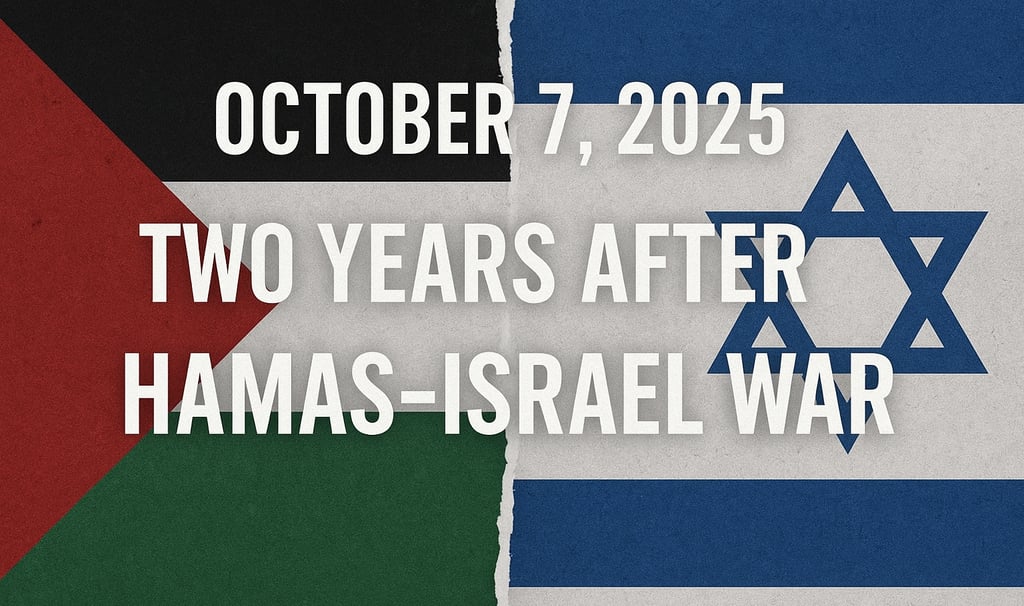October 7, 2025: Two Years After the Hamas–Israel Attack — War, Memory & Peace Efforts
Two years after the Hamas–Israel attack, war, memory, and peace talks define October 7, 2025 — the latest updates and verified news in detail.
Raja Awais Ali
10/7/20252 min read


October 7, 2025: Two Years After the Hamas–Israel Attack — War, Memory, and the Struggle for Peace
On October 7, 2025, Israel and the world mark two years since the devastating Hamas-led assault that changed the face of the Middle East. The October 7, 2023 attack targeted southern Israel, including the Nova music festival and nearby border towns, killing about 1,200 people and taking 251 hostages. The anniversary comes amid renewed violence, fragile ceasefire talks, and a worsening humanitarian crisis across Gaza.
In response to the 2023 assault, Israel launched one of the largest military operations in its history. According to Gaza’s health ministry, more than 67,000 Palestinians have been killed and nearly 170,000 injured in Israeli air and ground operations. Entire neighborhoods, schools, and hospitals have been reduced to rubble, leaving Gaza in a state of total destruction. On the Israeli side, reports confirm 1,665 deaths, including 466 soldiers, while 48 hostages remain missing in Gaza, some believed still alive. The losses have deepened pain and division in both societies, with families demanding answers, justice, and peace.
Across Israel, the day of remembrance was marked by solemn ceremonies. At the Nova music festival site, hundreds gathered to light candles and lay flowers in memory of victims. In rebuilt kibbutzim such as Be’eri, Kfar Aza, and Nir Oz, survivors paid tribute to those killed while continuing efforts to rebuild their shattered communities. Public opinion remains split, with many Israelis blaming Prime Minister Benjamin Netanyahu for failing to secure a permanent ceasefire or ensure the safe return of all hostages.
Meanwhile, peace negotiations have resumed in Sharm el-Sheikh, Egypt, under Egyptian and Qatari mediation. Talks are centered on a permanent ceasefire, hostage release, and Gaza reconstruction. A U.S.-backed peace proposal, reportedly supported by President Donald Trump, suggests Israel’s phased withdrawal from Gaza in exchange for Hamas disarmament and the deployment of international peacekeeping forces. However, Hamas’s military wing has rejected Trump’s plan, calling it biased and unacceptable. Analysts warn that failure of these talks could spark a new wave of violence across the region.
International reactions to this day have been mixed but deeply emotional. UN Secretary-General António Guterres urged the “immediate and unconditional release” of all hostages, describing the day as “a wound that still bleeds.” The European Union and Germany reiterated their support for Israel’s security while calling for restraint and protection of civilians. Italy banned a pro-Palestinian rally in Bologna due to rising tensions, and the Vatican’s top diplomat, Cardinal Pietro Parolin, described Israel’s Gaza campaign as “a continuing massacre,” though acknowledging Israel’s right to defend itself. Hamas, on the other hand, marked the date as “a day of victory,” further deepening global divisions.
Two years later, the scars of the war remain visible on every street, every border, and every heart. Gaza lies in ruins, families remain displaced, and thousands are still missing. Israel continues to live under fear of renewed attacks, while Palestinians face the despair of destruction and loss. The world watches closely as Egypt hosts the latest round of negotiations, hoping for an outcome that could finally end years of bloodshed. Whether peace emerges or war resumes will define the next chapter of this enduring conflict.
The message of this day is clear: true victory lies not in war, but in peace. After two years of pain, the world still waits for both sides to choose dialogue over destruction and humanity over hatred.
Stay informed with the latest national and international news.
© 2025. All rights reserved.